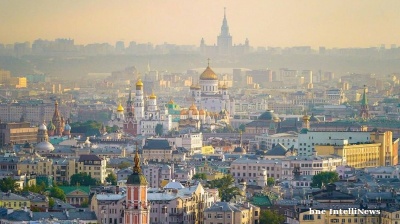Russia’s CBR ups key interest rate by whopping 200bp to 18%, raises GDP growth forecast to 3.5% for 2024

The board of the Central Bank of Russia (CBR) increased the key interest rate by 2 percentage points from 16% to 18%, in line with consensus expectations, at the policy meeting on July 26. This marks the first rate hike since December 2023, when the CBR hiked the rate from 15% to 16%.
As followed by bne IntelliNews, the CBR's board at the last June 7 policy meeting also resolved to keep the key interest rate unchanged at 16%, making a neutral rate decision for the fourth consecutive time. (chart)
The CBR also hiked its forecast for the country's GDP growth to 3.5-4% this year, adjusting its medium-term forecast at the same meeting. At the same time, the Central Bank lowered its GDP growth forecast for 2025 to 0.5-1.5%. Previously the figure was at 1-2%. The forecast for 2026 was reduced to 1-2% from the previously expected 1.5-2.5%. In 2027, the regulator expects economic growth in the range of 1.5-2.5%.
With mounting inflationary pressures building up, the regulator was expected to significantly hike the interest rate at the July 26 policy meeting. The CBR officials have been clearly guiding for another key rate hike and a prolonged monetary policy tightening.
The forecast for the average key rate for the current year has increased to 16.9-17.4% from 15-16%. Next year, the CBR anticipates the average key rate to be around 14-16%.
The CBR followed up on its guidance and has resolved to notably hike the key interest rate despite the easing of the weekly inflation in July, slowing down of the industrial output growth in June, rolling back of the state mortgage support programme, and other recent signs of somewhat milder economic overheating.
“Inflation has accelerated and is trending well above the CBR’s April forecast. The growth of domestic demand continues to significantly outpace the ability to expand the supply of goods and services. Additional monetary policy tightening is required for inflation to start falling again,” the CBR commented in the press release.
Notably, the CBR reiterated its previously telegraphed hawkish stance and warnings that a prolonged tight monetary policy cycle is under way, by adding that “monetary conditions substantially tighter than previously assumed are needed to bring inflation back to target”.
The regulator also raised its inflation forecast for 2024 to 6.5%-7%, making a pronounced worsening of the inflation outlook from the previous 4.3%-4.8%. The CBR still expects the inflation to fall to 4-4.5% in 2025 and to 4% in 2026 (previously the regulator had hoped to see 4% target inflation already in 2025).
The CBR also reiterated its view that the economy is overheating. "Consumer activity remains high against the backdrop of significant growth in household incomes and confident consumer sentiment. Strong investment demand is supported by both budgetary incentives and high corporate profits. The upward deviation of the Russian economy from the balanced growth trajectory is not diminishing," the CBR commented.
The analysts surveyed by RBC business portal expect the CBR to hike the key rate at least once more by the end of 2024, with some not ruling out a key rate of 20% by the end of 2024. The CBR indeed stressed that it "will assess the feasibility of further increases in the key rate at its next meetings".
Rosbank commented that CBR’s rhetoric in the press release is tougher than expected, with the analysts reading the wording on potential further interest rate action as “a base case scenario of another key rate hike in September”.
The analysts are seeing a clear signal that the CBR is willing to keep the key rate at high levels while the economy is overheating, the labour market remains tight and foreign trade uncertain.
Data

Military aid for Ukraine falls despite new Nato PURL initiative – Statista
The Kiel Institute for the World Economy found that military aid to Ukraine dropped sharply in July and August compared to previous months, despite the implementation of the Nato PURL initiative.

IMF cuts Russia’s 2025 growth forecast to 0.6%, leaves Ukraine's unchanged at 2%
The International Monetary Fund has lowered its forecast for Russia’s economic growth in 2025 to just 0.6%, marking the second-steepest downgrade among major economies, even as it raised its global outlook.

Russia's PMI indices plummet as economy cools
Russia’s private sector entered deeper contraction in September, as both services and manufacturing activity declined, according to the latest PMI data published by S&P Global.

Japan’s current account surplus dips as overseas earnings weaken
The surplus nevertheless remained in positive territory for the seventh consecutive month and was the second-highest on record for August.


